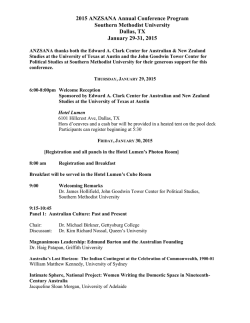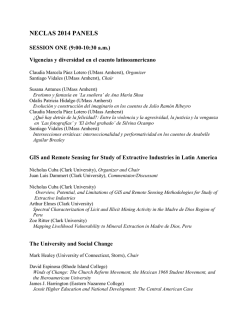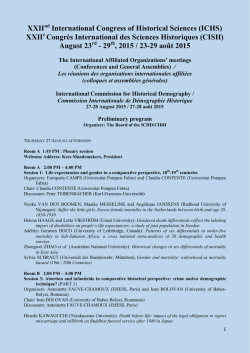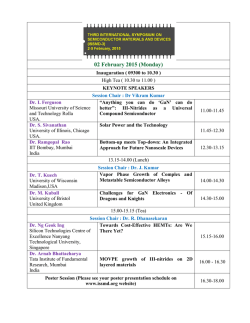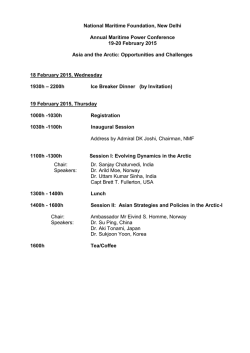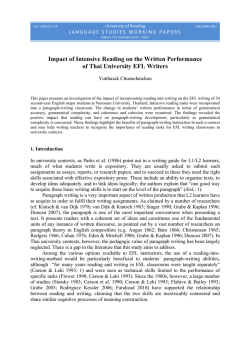
Programme - Regional Studies Association
Version: 30 January 2015 Programme Wednesday, 4th February 2015 14.00-18.00 19.00-21.00 Study Trip (optional) – Guided Riga City tour and site visit to the OlainFarm, pharmaceutical company and EU co-funded project Welcome Reception: Edgars Šadris, Director of the EU Funds Strategy Department, Ministry of Finance of the Republic of Latvia Peter Berkowitz, Directorate-General for Regional and Urban Policy, European Commission Professor Andrew Beer, Chair of the Regional Studies Association & the University of Adelaide Professor Marcis Auziņš, Rector of the University of Latvia Venue: SemaraH Hotel Metropole, Aspazijas bulvāris 36/38, Riga Thursday, 5th February 2015 8.00-9.00 Registration and welcome coffee 9.00-10.30 Opening Plenary Moderated by Professor Andrew Beer, Chair of the Regional Studies Association Jānis Reirs, Minister of Finance of the Republic of Latvia Video message by Corina Creţu, Commissioner for Regional Policy Dr Walter Deffaa, Director-General for Regional and Urban Policy, European Commission Professor John Bachtler, European Policies Research Centre 10.30 - 11.00 Coffee break 11.00-12.45 Parallel workshop sessions – round 1 Workshop 1 Small Hall Economic Geography and Cohesion Policy Workshop 2 OPEN Auditorium Europe 2020 and Smart Specialisation (1) Workshop 3 Great Hall Assessing the Reform of Cohesion Policy for the 2014-2020 Period Chair: Adrian Healy, Cardiff University Discussant: Lewis Dijkstra, European Commission Chair: Kevin Richardson, Higher Education Funding Council for England Discussant: Katja Reppel, European Commission Chair: Marjorie Jouen, Notre Europe - Jacques Delors Institute Discussant: Piotr Zuber, Ministry of Infrastructure and Development, Poland Peter Berkowitz: A more Effective and Efficient Policy? Assessing the Kathryn Pain et al.: Europe as a Global Macro-Region: How is Economic Marta Dobrzycka: Smart Specialization – the New Concept of Cohesion Policy in Workshop 4 Room 104 Improving the Leverage of European Territorial Cooperation Chair: Colin Wolfe, European Commission Discussant: Silke Haarich, Haarich Regional Research and Development Workshop 5 Room 258 What works in Cohesion Policy? The Performance of the Funds (1) Chair: Klaudius Maniokas ESTEP Vilnius Discussant: Ángel Catalina Rubianes, European Commission Urszula RomanKamphaus: How to Achieve Successful European Territorial Grzegorz Gorzelak: Cohesion Policy and Regional Development in Venue: University of Latvia, Raiņabulvāris 19, Riga LV-1050, Latvia Geography Changing the Cohesion Policy Challenge? Ugo Fratesi et al.: Territorial Capital and the Impact of European Cohesion Policy Jurijs Spiridonovs: Developing Regional Infrastructure in the Baltic Region Paola Annoni et al.: Analysing the Main Factors of Regional Economic Growth: Implications for EU Cohesion Policy 2014-2020 to Boost Regional Innovation. The Case of Poland Judit Kalman et al.: Coordinated Policies (Lisbon/EU2020) and Cohesion Policy: Their Relationship and Impact on the Member States Viktoriia Panova et al.: Understanding the Operational ‘Logics’ of EU ‘Smart Specialisation’ and the Implementation Choices for Regions in Europe Alise Vitola et al.: Smart Work for Smart, Sustainable and Inclusive Growth in Regions Implementation of the Reform of Cohesion Policy Willem Molle: Cohesion and Growth: Is the EU System Fit to Face the Challenges beyond 2020? Wolfgang Petzold: What if Regions and Cities Governed EU Regional and Urban Policy? Domenico Gullo et al.: Shifting in Economic Priorities 12.45-14.00 Lunch 14.00 –15.45 Parallel workshop sessions – round 2 Workshop 6 Small Hall What works in Cohesion Policy? The Performance of the Funds (3) Chair: Veronica Gaffey, European Commission Discussant: Richard Brooš, Permanent Representation of the Slovak Republic to the EU Workshop 7 OPEN Auditorium Modelling the Impact of Cohesion Policy (1) John Bachtler et al.: The Long-Term Achievements of EU Cohesion Policy Andrzej Paczoski: Creating an Effective Cohesion Policy in Nicola Pontarollo: The Impact of European Structural Funds in Objective 1 Regions: Between Cohesion Policy and Lisbon Agenda Workshop 8 Room 258 Integrated Territorial Approaches – ITIs and CLLD Chair: Dalia Belicka, EY Latvia Discussant: Ugo Fratesi, Politecnico di Milano Chair: Alexandra Zakrzewska, Ministry of Infrastructure and Development, Poland Discussant: Arno van der Zwet, University of Strathclyde / European Policies Research Centre Marlène Siméon: Integrated Sustainable Development in the Hand of Local and Regional Governments: The Cooperation? – Lessons from the Cross-Border Cooperation Programmes in Central-Eastern Europe Iruma Kravale: Improving the Visibility of Results from European Territorial Cooperation Programmes and Projects Adi Weidenfeld: Policy Implications for Overcoming Cultural Barriers to Cross Border Knowledge Transfer Poland – First Assessments Biagio Perretti: Italy’s Mezzogiorno: 2007-2013 EU Cohesion Policy’s Main Failure. Did we Learn Anything Useful for the 20142020 Period? Ramona Frunza et al.: EU Eastern Periphery: An Evaluation of Cohesion Policy in Romania and Bulgaria Workshop 9 Room 104 Accountability and Good Communication in Cohesion Policy Workshop 10 Great Hall What works in Cohesion Policy? The Performance of the Funds (2) Chair: Pasi Rantahalvari, Ministry of Employment and the Economy, Finland Discussant: Grzegorz Gorzelak, University of Warsaw Chair: Wolfgang Petzold, Committee of the Regions Discussant: Tim Goodship, Department for Business, Innovation and Skills, United Kingdom Maaike Damen: Cohesion Policy in the Netherlands: Is There a Situation of Good Accountability? Nata Lasmane: Venue: University of Latvia, Raiņabulvāris 19, Riga LV-1050, Latvia Giuseppe Provenzano: Cohesion Policy in Southern Italy: Weaknesses and Opportunities Aleksandrs Dahs: the Context of Europe 2020 Silke Haarich: How to Evaluate Intangible Achievements in Cooperation and Governance? A New Methodology. Nicoleta Carmen Olteanu: The Achievements of the 2007-13 Cohesion Policy in the Baltic Sea Region Danute Burakiene: The Use of Evaluation as a Result-Based Management Tool: Lithuanian Case Giuseppe Francesco Gori et al.: A Macroeconomic Impact Assessment of the 2007-2013 EU Cohesion Policy in Tuscany Jerzy Pienkowski et al.: Econometric Assessments of Cohesion Policy Growth Effects - How to Make them more Relevant for Policy Makers? 15.45-16.15 Coffee break 16.15-18.00 Parallel workshop sessions – round 3 Workshop 11 Great Hall Administrative Capacity and the Governance of Cohesion Policy Workshop 12 Small Hall Modelling the Impact of Cohesion Policy (2) Workshop 13 OPEN Auditorium Integrated Territorial Approaches and Urban Development Chair: Ann-Kerstin Myleus, European Commission Discussant: Mascha Möbius, Federal Ministry for Economic Affairs & Energy, Germany Chair: Duarte Rodrigues, Cohesion and Development Agency, Portugal Discussant: Janusz Zaleski, Wroclaw University of Technology Lewis Dijkstra: Quality of Government and Economic and Social Development in EU Regions Neculai-Cristian Surubaru: Administrative Capacity vs. Governance – How to Elita Jermolajeva et al.: The Helix Model as a Tool for Improved Performance and Achievements of the Cohesion Policy Results Mara Giua et al.: How does the Net Impact of the EU Arno van der Zwet et al.: Towards a Europe of the Localities? Integrated Place-Based Approaches in Cohesion Policy in 2014-20 and Beyond Piotr Zuber: Critical Perspectives on Integrated Territorial Use of Integrated Territorial Investments in Cohesion Policy Ivan Tosics: Integrated Territorial Investment - A Missed Opportunity? Jarosław Hawrysz: Polish Example: Lessons learned on Local Initiatives Implementation and Future Challenges from the EC Perspective. Chair: Stephen Fox, Panliska Discussant: Martijn De Bruijn, European Commission Accountability of EU Funds Administration Karolina Wrona: Seeing is Believing? Methodological Implications from the Evaluation Study on Good Practices in Communicating Cohesion Policy Measuring Demographic Impact of the 2007-2013 Regional and Cohesion Policy Actions in Latvia Adrian Healy et al.: Building Resilient Economies: Lessons from the Crisis for EU Cohesion Policies Benedict Wauters et al.: Where did the Well-Being go in ESIF? Workshop 14 Room 104 Policy Targeting and more Efficient Management in Implementing the Funds Chair: Carol Sweetenham, Department for Communities and Local Government, United Kingdom Discussant: Liga Baltina, University of Latvia Andrey Demidov: Efficient Implementers and Partners - What do we Miss in our Understanding how Cohesion Policy Administrators Work? Emils Pulmanis: Polycentric Workshop 15 Room 258 Using Cohesion Policy to address Youth Unemployment Venue: University of Latvia, Raiņabulvāris 19, Riga LV-1050, Latvia Chair: Olegs Krasnopjorovs, Bank of Latvia Discussant: Resa Koleva, European Commission Olga Starineca: Cohesion Funds and Youth Employment in Latvia Joan Ganau et al.: Youth Employment, Migrations and the Construction of a New European Labour Market Peter Wells et al.: Improve the Management and Implementation Environment for European Structural and Investment Funds? Evidence from New Member States Ulrich Graute: Strengthening Public Administration and Effective Management by Widening the Focus of Programmes and Capacity Building to Better Face the NonLinear Complexity of Developments Septimiu-Rares Szabo: The Administrative Capacity of the SubNational Level in Implementing Cohesion Policy in Romania 20.00 Regional Policy Differ across Countries? Klaudijus Maniokas: Policy as a Major Conditionality: Conclusions of Two Recent Impact Evaluations in Lithuania D'Artis Kancs et al.: Assessing the Impact of Cohesion Policy Programmes 20142020: a Model-Based Approach Development in 2014-2020 Ilona Raugze et al.: Challenges and Practical Aspects in Implementation of Place-Based Approach Gabor Novotny: The Rise and Fall of Integrated Approaches - On Troubled Waters from Concept to Implementation. Development Project Micro-Economical Aspects and Application Process in Public Administration in Latvia New Approaches to Addressing Youth Unemployment: New Roles for the European Union’s Structural Funds? Gonul Oguz: Linking the Cohesion Funds into the Integration of Youth Immigrants in the European Labour Markets Gala dinner Friday, 6th February 2015 8.30-9.00 Registration and welcome coffee 9.00-9.30 Opening Speech Moderated by Dr Walter Deffaa, Director-General for Regional and Urban Policy, European Commission Iskra Mihaylova, Member of the European Parliament, Chair of the Regional Development (REGI) Committee Venue: University of Latvia, Raiņabulvāris 19, Riga LV-1050, Latvia 9.30-11.15 Parallel workshop sessions – round 4 Workshop 16 Great Hall Economic Governance and Cohesion Policy Workshop 17 OPEN Auditorium Europe 2020 and Smart Specialisation (2) Chair: Ernst Holzinger, Federal Chancellery of Austria Discussant: Iain Begg, London School of Economics Simone Reinhart: Macroeconomic Conditionality - the Link between Economic Governance and Cohesion Policy from an Inter-Institutional Perspective Aleksandra Zakrzewska: Mutual Relationships Between the EU Cohesion Policy and Economic Governance Marjorie Jouen: Linking ESIF to Sound Economic Governance, the Story of a Triple Punishment for Local and Regional Authorities Stijn Verhelst: Macroeconomic Conditionality: In Search of a Balanced Approach 11.15 - 11.30 Chair: Conceição Moreno, Cohesion and Development Agency, Portugal Discussant: Alise Vitola, CrossSectoral Coordination Centre Henning Kroll: The Policy Challenge in Smart Specialisation Kevin Richardson et al.: Smart Specialisation: From Concept & Strategies to Delivery Peter Wostner: To what Extent does Smart Specialization solve the 'one-sizefits-all' Problem? Workshop 18 Small Hall Regional Imbalances and the Impact of Cohesion Policy Chair: Andrew Beer, Regional Studies Association & University of Adelaide Discussant: Nicola Pontarollo, University of Verona Piotr Rosik et al.: Evaluation of the Impact of Construction of Motorways and Expressways in Poland in the Years 2004-15 on Accessibility and Cohesion Ángel Catalina Rubianes et al.: Why Economic Imbalances Matter for Regional Development Eduardo Medeiros: EU Cohesion Policy in Iberian Peninsula: Main Territorial Impacts (1989-2013) and Challenges for a More Efficient New Programming Period (2014-2020) Workshop 19 Room 104 Financial Instruments – Lessons from Implementation Chair: Chris Poppe, Ministry of Economic Affairs, the Netherlands Discussant: Carla Leal, Cohesion and Development Agency, Portugal Workshop 20 Room 258 Youth Unemployment and Social Exclusion Andrea Di Anselmo et al.: Early Stage Funds and ERDF CoFinancing: Lesson learned from the Experience of the Ingenium Funds in Italy Daina Belicka et al.: How to Use Financial Instruments for Cohesion and for Which Interventions? Theory and Practice with a Case Study on the Situation in the Baltic States Gyorgyi Nyikos: The Role of Financial Instruments in Improving Access to Finance in LessDeveloped Regions - Combined Microcredit in Hungary Fiona Wishlade et al.: Financial Instruments in 2014-20: Learning from 2007-13 and Adapting to the New Environment Katharina Zimmerman: Social Inclusion Funded by Europe? The Impact of the European Social Fund on Local Social and Employment Policies Olegs Krasnopjorovs,: How to Overcome Youth Unemployment: Education vs. Temporary Employment Ireneusz Jazwinski: Changes in Social Cohesion in the Member States of the European Union in Crisis Conditions Coffee break Venue: University of Latvia, Raiņabulvāris 19, Riga LV-1050, Latvia Chair: Resa Koleva, European Commission Discussant: Judit Kalman, Institute of Economics, Hungarian Academy of Sciences 11.30-13.00 Parallel workshop sessions – round 5 Workshop 21 Room 258 Management and Implementation of the Funds Workshop 22 OPEN Auditorium Youth Unemployment and Equal Opportunities Workshop 23 Small Hall Cohesion Policy and Regional Innovation Chair: Willem Molle, Erasmus University Rotterdam Discussant: Katri Seier, Ministry of Finance, Estonia Chair: Maaike Damen, University of Twente Discussant: Peter Wells, Sheffield Hallam University Chair: Edmunds Valantis, Ministry of Economics, Latvia Discussant: Marta Dobrzycka, Warsaw School of Economics Jale Tosun et al.: The Absorption of Structural and Investment Funds and Youth Unemployment: An Empirical Test Leaza McSorley et al.: Whatever Happened to Gender Mainstreaming? Lessons for the 201420 European Structural and Investment Funds Daiva Repeckaite: Patchwork of Projects or Coherent Strategy? Equal Opportunities in the Implementation of EU Structural Assistance in Lithuania Niall MacKenzie: From "Technium" to "Emptium": Innovation Policy and Structural Funds in a Weaker EU Region Jose MellaMarquez et al.: Cohesion Policy and Innovation: How Can Resources be Used Most Effectively Theodora Stathoulia: ReInventing Policies and Practices in Regional Strategy Liga Baltina et al.: What Institutional Arrangements for Coherent EU Cohesion Policy Planning and Implementation? Istvan Janos Tóth: The Missing Link? Corruption Risks in EU Funded Public Procurement Tenders Carol Sweetenham: Balancing the Demands of Localism and Compliance: Setting up the New ERDF Programme in England Workshop 24 Room 104 Administrative Practice and Reform in the Management of the Funds Chair: Mina Shoylekova, European Commission Discussant: Ulrich Graute, Senior Adviser/Consultant Workshop 25 Great Hall Territorial Cohesion and Territorial Impacts of Cohesion Policy Josip Mihalic: Public Actor Constellations in Formulation of Operational Programmes: Differentiation by the Policy Networks Theory Mark A. Langley: Administrative Reform, Capacity-Building and Cohesion Policy Savina MihaylovaGoleminova: Is a Change Necessary in the Coordination and Management System for Assistance Granted from the Structural and Cohesion Funds of the European Union in Bulgaria? Stefan Telle: Governing Soft Spaces with Fuzzy Boundaries: Regional Polarization, Democratic Accountability, and Strategic-Selectivity in Cohesion Policy Tomasz Komornicki: The Concept of Territorial Cohesion as Understood and Practiced by Polish Regions Gergo Medve-Balint: Supporting the Rich and the Politically Loyal: How the Structural Funds May Contribute to Rising Regional Disparities in Eastern Europe Purushottam Kesar: "Territorial Cohesion" in the Emerging Economic Geography of Europe: Examining Cohesion Policy Architecture for the New Financing Period (2014-20) Venue: University of Latvia, Raiņabulvāris 19, Riga LV-1050, Latvia Chair: Didier Michal, General Commission for Territorial Equality, France Discussant: Urszula Roman-Kamphaus, University of the West of Scotland 13.00 – 14.00 Lunch Closing Session – Future Research Agendas Moderated by Professor John Bachtler, European Policies Research Centre Dr Walter Deffaa, Director General for Regional and Urban Policy, European Commission Professor Iain Begg, London School of Economics 14.00-15.00 Closing remarks: Andris Piebalgs, Advisor to the President of the Republic of Latvia, Former Commissioner of the European Commission Venue: University of Latvia, Raiņabulvāris 19, Riga LV-1050, Latvia
© Copyright 2026
